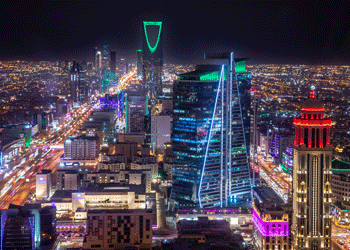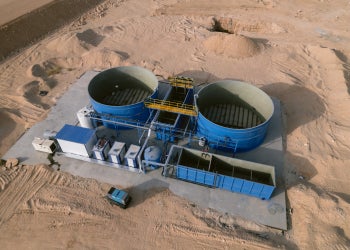Wood seeks to improve grip on Gulf market
23 July 2024

Considering the cyclical nature of the oil and gas industry, which often takes a toll on the financial health of service providers, Wood Group has done well to maintain stability in its business. In a recently published update on its trading in the first half of 2024, the UK-based oil and gas industry consultant said its order book of $6.1bn is up 2% compared to June 2023.
Contract wins in the Gulf region have significantly contributed to Aberdeen-headquartered Wood’s financial standing. “We have been very successful in the past 18-24 months,” says Gerry Traynor, senior vice-president of Middle East projects at Wood.
“We have got a really strong position in Iraq through our operations business. In the countries that I look after – Saudi Arabia, the UAE, Qatar, Oman and Kuwait – we’ve seen a strong growth. I see that continuing in the next 18-24 months,” he tells MEED.
Saudi business growth
 Wood has been a key service provider to Saudi Aramco and is part of the General Engineering Services-plus pool of consultants. The firm is currently involved in “some huge programmes” by Aramco, according to Traynor.
Wood has been a key service provider to Saudi Aramco and is part of the General Engineering Services-plus pool of consultants. The firm is currently involved in “some huge programmes” by Aramco, according to Traynor.
“We have been successful in signing up contracts with engineering, procurement and construction (EPC) contractors” for the third expansion phase of the Master Gas System, he says.
“Wood has also been successful in winning framework agreements for gas increment programmes with Aramco. We signed those contracts during the last four weeks,” he adds.
In October 2023, MEED reported that Aramco appointed firms to deliver project management consultancy (PMC) services for different segments of its estimated $100bn liquids-to-chemicals (LTC) programme. Wood was among those selected – along with US-based KBR, France's Technip Energies and Australia's Worley.
Aramco’s global LTC programme aims to convert 4 million barrels a day (b/d) of its oil production into high-value petrochemicals and chemical feedstocks by 2030. Aramco, and its subsidiary Saudi Basic Industries Corporation (Sabic), plan to establish 10-11 large mixed-feed crackers by 2030 as part of the petrochemicals investment scheme.
“[LTC] is a very exciting programme," Traynor says, adding that Wood was involved in the pre-front-end engineering and design (pre-feed) and study for the project. "It was a combined effort from our team in Reading [UK] and in Saudi Arabia.”
Front-end engineering and design (feed) for the LTC projects is expected to “kick-off in the second half of this year”, he adds.
Another major Aramco project that Wood has played a key role in is the Accelerated Carbon Capture and Sequestration (ACCS) programme, which is expected to become the world’s largest carbon capture and sequestration (CCS) hub.
Through the scheme, Aramco aims to transport 9 million tonnes a year (t/y) of emissions and sequester it within onshore geological storage by 2027. Aramco plans to store up to 14 million t/y of carbon dioxide (CO2) equivalent by 2035 – contributing to Saudi Arabia's CCUS goal of 44 million t/y by 2035.
In June, Wood announced that it had completed feed works for the first phase of the ACCS project. “In terms of the next phase, our desire is to support Aramco with PMC services, over their EPC contractor,” Traynor says.
Contract wins in the Gulf region have significantly contributed to the company’s financial standing
Key player in Abu Dhabi
Wood's business in the UAE, meanwhile, is predominantly about serving Abu Dhabi National Oil Company (Adnoc).
“We have the two largest feed contracts going on right now, in that we are supporting Adnoc Sour Gas and Adnoc Gas with their P5 programmes,” Traynor says.
Adnoc's P5 production enhancement plan aims to increase Abu Dhabi's crude production to 5 million b/d by 2027.
“We also have a number of PMC contracts where we supply [staff] to Adnoc,” Traynor adds.
Separately, Wood is looking to increase its involvement in the upcoming chemicals and derivatives complex in Ruwais, which is being developed by Taziz – a 60:40 joint venture of Adnoc and Abu Dhabi’s industrial holding company ADQ.
Wood, which performed feed work on projects in the first phase of the Taziz Industrial Chemicals Zone, is keen to get involved in the second phase. “We have been talking to the team in Taziz,” Traynor says.
Positioning in Oman
“Oman has been really good for us,” continues Traynor, adding that the company provided PMC services for the Duqm Refinery project, which was commissioned in February this year.
OQ8, the 50:50 joint venture of Oman’s state energy holding company OQ and Kuwait Petroleum International, the overseas business unit of Kuwait Petroleum Corporation, is the operator of the estimated $7bn refining complex in the sultanate.
“It has certainly gone quiet through 2024 as we start to wind down and hand that project over to the full operations team," Traynor says.
“Our focus in Oman as we move forward is to support clients with feed and PMC services. It is going to be very slow with demand projections in Oman for the next two years or so, but I do see it picking up for us as we get into 2025, and then through 2026 and 2027, when we will start to see more decarbonisation projects come through.
“Also, we are doing pre-feed and feed works for other projects in Oman from our offices in the UK,” he adds.
With regards to new projects in the sultanate, Shell recently announced that it has begun work on the Blue Horizons project – a scheme to develop a blue hydrogen and blue ammonia production facility in Oman. It has appointed Wood to perform pre-feed work on the proposed complex and its associated CO2 pipeline and injection facilities.
“We have been working with Shell on the Blue Horizons project for quite some time. The kick-off will happen soon,” says Traynor.
“We are mainly executing the pre-feed work on the project from our Milan office,” he says, adding: “We will be employing local graduates to help support the work.”
Exclusive from Meed
-
 Solar deals signal Saudi Arabia’s energy ambitions
Solar deals signal Saudi Arabia’s energy ambitions13 February 2026
-
 Saudi Arabia appoints new investment minister
Saudi Arabia appoints new investment minister13 February 2026
-
 Indian firm wins major Oman substation contract
Indian firm wins major Oman substation contract12 February 2026
-
 Developers appoint contractor for $500m wastewater treatment project
Developers appoint contractor for $500m wastewater treatment project12 February 2026
-
 Dewa raises Empower stake in $1.41bn deal
Dewa raises Empower stake in $1.41bn deal12 February 2026
All of this is only 1% of what MEED.com has to offer
Subscribe now and unlock all the 153,671 articles on MEED.com
- All the latest news, data, and market intelligence across MENA at your fingerprints
- First-hand updates and inside information on projects, clients and competitors that matter to you
- 20 years' archive of information, data, and news for you to access at your convenience
- Strategize to succeed and minimise risks with timely analysis of current and future market trends

Related Articles
-
 Solar deals signal Saudi Arabia’s energy ambitions
Solar deals signal Saudi Arabia’s energy ambitions13 February 2026
 Commentary
Commentary
Mark Dowdall
Power & water editorSaudi Arabia’s recent agreement to build $2bn-worth of solar power plants in Turkiye is the latest sign that the kingdom’s energy influence is changing.
Historically, this was measured in oil barrels and export volumes. Increasingly, this is extending to capital, structuring expertise and the ability to deliver record-low tariffs in competitive markets.
Announcing the deal, Turkish Energy Minister Alparslan Bayraktar said tariffs for the plants would be the country’s lowest on record, with electricity purchased under 25-year power purchase agreements.
It followed another announcement, in January, that Acwa is investing $200m to build a large-scale solar photovoltaic (PV) plant in the Philippines.
Whether Saudi-backed companies ultimately retain long-term stakes or primarily develop and build the assets, their role at the front end is significant.
Sponsors that bring sovereign backing, clear procurement processes and access to low-cost financing can influence tariffs and contract terms from the outset.
There is also a geopolitical layer. Investing in Turkiye, or anywhere for that matter, strengthens political and economic ties at a time when regional alignments are shifting.
Energy infrastructure is also long-term by its nature. It connects ministries, regulators, lenders and operators in relationships that often extend well beyond a single transaction.
Saudi Arabia has spent the past few years refining its approach to pricing, structuring and financing large-scale renewables at home.
Exporting that expertise may not rival oil in scale or visibility, but it does signal that Saudi Arabia is becoming more than just an energy supplier.
Increasingly, it is becoming a participant in how other countries design and finance their energy transitions. That influence is still significant.
https://image.digitalinsightresearch.in/uploads/NewsArticle/15645903/main.jpg -
 Saudi Arabia appoints new investment minister
Saudi Arabia appoints new investment minister13 February 2026
Register for MEED’s 14-day trial access
King Salman Bin Abdulaziz Al-Saud has made a series of senior government changes, including Khalid Al-Falih leaving his role as investment minister to become minister of state and a member of the cabinet.
Al-Falih has been replaced by Fahad Al-Saif as investment minister. Al-Saif has been head of the Investment Strategy and Economic Insights Division at the Public Investment Fund (PIF) since 2024. That role involved formulating PIF’s long-term investment strategy. He has also served as head of the Global Capital Finance Division, a role he has held since joining PIF in 2021.
The change of investment minister comes at a time when securing investments has become a key priority for Saudi Arabia as it prepares to hand over more projects to the private sector for delivery.
King Salman also named Abdullah Al-Maghlouth as vice-minister of media and Abdulmohsen Al-Mazyad as vice-minister of tourism. Khalid Al-Yousef was named attorney general, and Sheikh Ali Al-Ahaideb will serve as president of the Board of Grievances.
Faihan Al-Sahli was selected as director general of the General Directorate of Investigation, while Abdulaziz Al-Arifi was chosen to lead the National Development Fund. Haytham Al-Ohali will head the Communications, Space and Technology Commission, and Fawaz Al-Sahli will chair the Transport General Authority.
https://image.digitalinsightresearch.in/uploads/NewsArticle/15645415/main.gif -
 Indian firm wins major Oman substation contract
Indian firm wins major Oman substation contract12 February 2026

India’s Larsen & Toubro has won a contract to build the Majan 400/220/132kV grid station in Oman.
Estimated to cost $100m, the project includes an associated 400kV line-in line-out underground cable from Sohar Free Zone to the Sohar Interconnector Station.
The contract was awarded by Oman Electricity Transmission Company (OETC), part of the government-owned Nama Group.
The grid station will comprise eight 400kV gas-insulated switchgear (GIS) bays, eight 220kV GIS bays and 10 132kV GIS bays at the new Sohar Free Zone substation.
The scope includes the installation of two 500MVA, 400/220kV transformers and two 500MVA, 220/132kV transformers.
Local firm Monenco Consulting Engineers was appointed in April last year to provide design and supervision services for the project.
As MEED exclusively revealed, the main contract was tendered in June, as part of three significant contracts to build new substations in the sultanate.
The second contract, worth about $35m, covers the construction of the Sultan Haitham City 132/33kV grid station and associated 132kV line-in line-out underground cables running 4 kilometres from Mabella to Mabella Industrial Zone.
The third contract, valued at about $100m, covers the construction of the Surab 400/33kV grid station and an associated 400kV line-in line-out cable from the Duqm grid station to the Mahout grid station.
Local firms Muscat Engineering Consulting and Hamed Engineering Services are consultants for the Sultan Haitham City and Surab projects, respectively.
The two remaining contracts are currently under bid evaluation, with awards expected this quarter.
https://image.digitalinsightresearch.in/uploads/NewsArticle/15638107/main.jpg -
 Developers appoint contractor for $500m wastewater treatment project
Developers appoint contractor for $500m wastewater treatment project12 February 2026

Register for MEED’s 14-day trial access
Egypt’s Orascom Construction has won the engineering, procurement and construction (EPC) contract for a major wastewater treatment project in Saudi Arabia’s Eastern Province.
A consortium of Saudi utilities provider Marafiq, the regional business of France’s Veolia and Bahrain/Saudi Arabia-based Lamar Holding is developing the $500m (SR1.875bn) industrial wastewater treatment plant (IWWTP) in Jubail Industrial City 2.
Sources close to the project confirmed the appointment to MEED, adding that the project has now entered the construction phase.
Industry sources also said that financial close on the project is expected to be reached in the coming days.
In September, the developer consortium was awarded a contract, under a 30-year concession agreement, by Saudi Aramco Total Refining & Petrochemical Company (Satorp), a joint venture of Saudi Aramco and France’s TotalEnergies.
The planned facility will treat and recycle wastewater from Satorp’s under-construction Amiral chemical derivatives complex, also in Jubail.
Marafiq, formally Power & Water Utility Company for Jubail and Yanbu, will own a 40% stake in the dedicated project company. Veolia Middle East SAS will hold a 35% stake, and Lamar Holding’s Lamar Arabia for Energy will hold the other 25%.
The planned IWWTP, which will primarily serve the $11bn sprawling Amiral chemicals zone, will implement advanced water treatment and recovery technologies to process complex industrial effluents, including spent caustic streams. Treated water will be reintegrated into the industrial processes, supporting closed-loop reuse and energy efficiency.
The project follows a concession-style model, akin to a public-private partnership (PPP), where the developer consortium invests in, builds and operates the wastewater plant over a 30-year period, with returns linked to service delivery.
Marafiq has been involved in several similar projects across Saudi Arabia, including as the sole owner of the Jubail industrial water treatment plant (IWTP8), which treats complex industrial effluents for petrochemical and heavy industrial companies.
In 2020, Saudi Services for Electro Mechanic Works was awarded the $202m main contract for the fourth expansion phase of IWTP8. Construction works on the project are expected to be completed by the end of the quarter.
 READ THE FEBRUARY 2026 MEED BUSINESS REVIEW – click here to view PDF
READ THE FEBRUARY 2026 MEED BUSINESS REVIEW – click here to view PDFSpending on oil and gas production surges; Doha’s efforts support extraordinary growth in 2026; Water sector regains momentum in 2025.
Distributed to senior decision-makers in the region and around the world, the February 2026 edition of MEED Business Review includes:
> AGENDA: Mena upstream spending set to soar> INDUSTRY REPORT: MEED's GCC water developer ranking> INDUSTRY REPORT: Pipeline boom lifts Mena water awards> MARKET FOCUS: Qatar’s strategy falls into place> CURRENT AFFAIRS: Iran protests elevate regional uncertainty> CONTRACT AWARDS: Contract awards decline in 2025> LEADERSHIP: Tomorrow’s communities must heal us, not just house us> INTERVIEW: AtkinsRealis on building faster> LEADERSHIP: Energy security starts with rethinking wasteTo see previous issues of MEED Business Review, please click herehttps://image.digitalinsightresearch.in/uploads/NewsArticle/15637523/main.jpg -
 Dewa raises Empower stake in $1.41bn deal
Dewa raises Empower stake in $1.41bn deal12 February 2026
Dubai Electricity & Water Authority (Dewa) has announced it has increased its stake in Emirates Central Cooling Systems Corporation (Empower) from 56% to 80%.
The transaction was completed through the purchase of 2.4 billion shares and the transfer of the entire ownership of Emirates Power Investment (EPI), which is wholly owned by Dubai Holding.
The total value of the deal is AED5.184bn ($1.41bn).
Empower currently holds over 80% of Dubai’s district cooling market and operates 88 district cooling plants across the emirate.
According to MEED Projects, the UAE’s district cooling sector currently has nine projects worth $1.29bn in the pre-execution phase.
Empower has ownership in four of these projects, which have a combined value of $472m.
This includes a $200 million district cooling plant at Dubai Science Park, with a total capacity of 47,000 refrigeration tonnes serving 80 buildings.
Empower signed a contract to design the plant last August, with construction scheduled to begin by the end of the first quarter of 2026.
The utility is also building a district cooling plant at Dubai Internet City.
UAE-based TMF Euro Foundations was recently appointed as the enabling and piling subcontractor for the project.
https://image.digitalinsightresearch.in/uploads/NewsArticle/15635949/main.jpg


